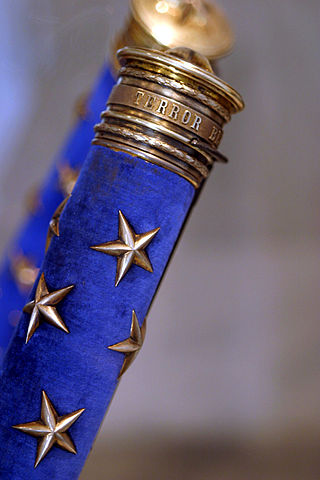
France had a permanent embassy to the Ottoman Empire beginning in 1535, during the time of King Francis I and Sultan Suleiman the Magnificent. It is considered to have been the direct predecessor of the modern-day embassy to the Republic of Turkey.

France had a permanent embassy to the Ottoman Empire beginning in 1535, during the time of King Francis I and Sultan Suleiman the Magnificent. It is considered to have been the direct predecessor of the modern-day embassy to the Republic of Turkey.
The first ambassador was preceded by an envoy: Jean Frangipani.

The Prix de Rome or Grand Prix de Rome was a French scholarship for arts students, initially for painters and sculptors, that was established in 1663 during the reign of Louis XIV of France. Winners were awarded a bursary that allowed them to stay in Rome for three to five years at the expense of the state. The prize was extended to architecture in 1720, music in 1803 and engraving in 1804. The prestigious award was abolished in 1968 by André Malraux, then Minister of Culture, following the May 68 riots that called for cultural change.

Marshal of France is a French military distinction, rather than a military rank, that is awarded to generals for exceptional achievements. The title has been awarded since 1185, though briefly abolished (1793–1804) and for a period dormant (1870–1916). It was one of the Great Officers of the Crown of France during the Ancien Régime and Bourbon Restoration, and one of the Grand Dignitaries of the Empire during the First French Empire.

François-Emmanuel Guignard, comte de Saint-Priest, was a French politician and diplomat during the Ancien Régime and French Revolution.

The Gardes du Corps du Roi was a cavalry unit of the maison militaire du roi de France.
A Colonel General was an officer of the French army during the Ancien Régime, the French Revolution, the Napoleonic era and the Bourbon Restoration.
The Minister for the Maison du Roi was a cabinet role under the French monarchy, conferring leadership of the Maison du Roi.
The following is a chronological list of classical music composers who lived in, worked in, or were citizens of France.

One Nation, One King is a 2018 French film written and directed by Pierre Schoeller. It stars Adèle Haenel, Gaspard Ulliel, Laurent Lafitte and Louis Garrel, and shows the French Revolution in Paris from the storming of the Bastille to the execution of the King. The film made its world premiere out of competition at the 75th Venice International Film Festival on 7 September 2018. It was released in France by StudioCanal on 26 September 2018.